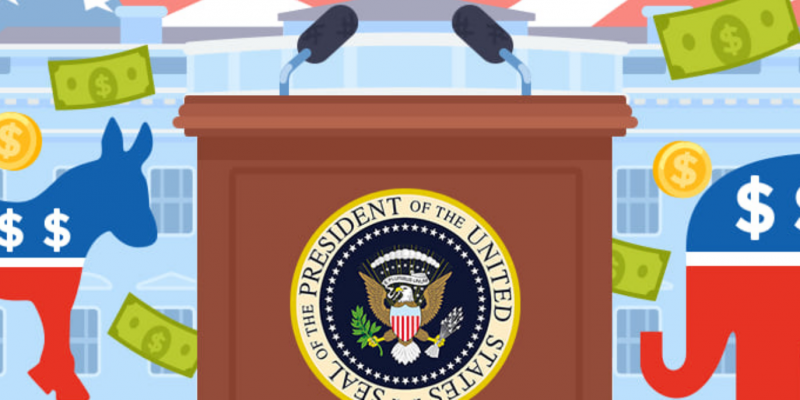It costs an average of $358 million to run for president of the United States, according to an analysis by the personal finance site, WalletHub. The analysis is based on financial disclosures and campaign spending data from candidates in 2016 and 2020.
The campaign and affiliates to reelect former president Barack Obama in 2012 spent more than $1.14 billion. The Trump campaign and affiliates spent approximately $439 million in 2016. Candidates for the Democratic nomination in 2020 have spent more than $726 million, with former New York City mayor Mike Bloomberg spending more than $400 million of his own money by the end of January 2020.
“Who wants to be president of the United States has turned into a game of who’s not a millionaire, who’s taking money from billionaires, which billionaire can buy love at the ballot box, and how many trillions of dollars in policy promises it takes to spark a movement,” John S Kiernan, managing editor at WalletHub wrote.
The WalletHub report analyzed seven candidates’ financial disclosure forms to “get a sense for how they’ve managed their finances in the past and perhaps how they’ll manage the country in the future.” It includes an infographic and comparisons to “how the average candidate’s savings compare to the average American’s and which candidates made a small fortune from speaking fees.”
The report excludes former Mayor Michael Bloomberg, whose wealth surpasses all candidates analyzed. According to Forbes, Bloomberg’s fortune exceeds $53 billion compared to Trump’s $3 billion.
Bloomberg first landed on the Forbes 400 list of America’s richest people with a fortune of “$350 million or more” in 1992. By 1996, Bloomberg’s worth had reached $1 billion.
From 1996 to 2019, “Trump’s net worth compounded at an annual rate of 8.8%, outperforming the 6.7% return of the S&P 500 stock index over the same period,” according to Forbes. “Most of Trump’s gain came in the first year, from 1996 to 1997, when his fortune jumped from an estimated $450 million to $1.4 billion. Bloomberg’s growth was bigger – and much more consistent– compounding at a rate of 18.8% a year.”
The seven candidates WalletHub analyzed are former Vice President Joe Biden, Hawaii Rep. Tulsi Gabbard, Minnesota Sen. Amy Klobucher, Vermont Sen. Bernie Sanders, Connecticut Sen. Elizabeth Warren, former Massachusetts governor William Weld, and President Donald Trump. Klobucher dropped out of the race Monday.
The average assets of the seven presidential candidates, according to WalletHub, is $208.5 million compared to the median assets of Americans of $29,410.
The average cash savings of these candidates is $16 million compared to the less than $1,000 held by most Americans.
Klobuchar and Warren have listed no liabilities on their financial disclosures, the report states, meaning they have declared no debt.
The average rate paid by the four candidates with real estate loans (Gabbard, Sanders, Trump and Weld) is 4.02 percent. The average interest rate on Weld’s personal loans is 6.31 percent. The interest rate on Biden’s life insurance loan is 6.5 percent.
Bloomberg is missing from the report because he requested and received a second extension for filing a personal financial disclosure report, WalletHub notes. Receiving the extension means Bloomberg won’t have to provide the details about his assets and income until after March 3.
All data pertaining to each candidate was sent to the candidates for verification, according to the report, to which only Klobuchar’s campaign responded.
The report was based on financial disclosures, information from the U.S. Census Bureau, the Federal Election and news reports.
This article was first published by The Center Square.
Advertisement
Advertisement

